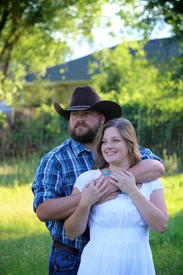Has anyone experienced this?
Replies
-
Well, just keep eating 2500 calories or more if you want. You still have a lot of weight to gain and your body is begging for food after being starved for so long. My binges stopped once I regained the weight I needed to gain.0
-
something you might want to think about (not sure if someone has mentioned it before) if you are craving food then you might want to think about what you are craving because its (as someone has previously stated) your body needing some type of nutrient, try this:

hope you get over this hurdle and level out at your target weight
good luck0 -
Keeping yourself busy is always a good idea! When I binge, it's because I'm pretty much procrastinating or bored, which gives me the chance to start thinking about food, and thus crave unhealthy stuff. If you feel you're going to start, try leaving your house (and carrying an appropriate snack with you is a good idea too).0
-
I'm going through a similar thing at the moment, so I feel your pain. I had some weeks where I would have binges several days straight! However am starting to get a handle on it, one thing I've learned is DO NOT restrict the day after you feel you've overeaten, as this will simply trigger another binge. The day after is always tough but it's important to carry on through with regular healthy meals. It's a hard thing to get your head round, but the excess calories from one binge session will not do any damage at all if you eat normally the next day. It's when you begin the binge-restrict cycle that it starts to become damaging. I find a different coping mechanism, instead of restricting, is exercise. Not excessively of course, just a nice walk or some moderate weight resistance. It will boost your mood and make you feel better about yourself which is crucial on the road to recovery!0
-
:creeps:0
-
1500 calories for a meal is a binge?
Apparently I binge just about every day....
Heck, if that is the measure then I binge twice a day.
OP, after reading the thread I'm just going to ay this, you're young, active, and under weight, and even though I don't know your stats, I can comfortably say that 1500 calories is not a binge, it's a meal, and with your level of activity, it's happening because you simply are not fueling your body properly, you should essentially be bulking at TDEE+10% in order to get your weight up to a healthy range, that's probably about two "binges" per day. Eat up.
Rigger0 -
I haven't red the other comments but...
Just let it go. Let it go. Let your body fed itself. No food is forbidden. Of course, it isn't as simple as calories in, calories out - some foods are 'healthier' than others, but I must ask you, which mind set is healthy when restricted?
What you are experiencing is a natural reaction - your body is catching up, and is more powerful than your mind. Let it guide you. Learn to detach yourself from the guilt. Try to visualize this as an experience, a new adventure. You are discovery the power of your body. Of course, anorexia is about control. I know, I experienced it. But isn't the mind ridiculously juvenile in comparison to the body? Your body is such a complex mechanism - it has evolved for thousands of years now. Your mind on the other hand, was born with you and will die with you. It is unique, an experience less thing, not as wise as your body.
Control and most importantly obsession isn't healthy. I've just recently understood this. Don't count calories. Just don't. Don't focus on your binges. Ok, this happened. There. What are you going to do`Well you will NOT focus on them - because if you do, that is when the true problems will start and that is when you will truly develop binge eating.
If you speak french, I could link you to a very interesting forum of young women and men recovering. The advice there is absolutely fabulous - but what really stood out that, all those who recovered said that binging was a natural stage of recovery and that, with time, it would reduce, to finally disappear when the body (not the mind!) was at a happy weight. And when you are there, do not diet. You'll just relapse. The fat tissue that will have formed upon your body will redistribute upon your body and your body will take care of it - if you learn to listen to it, you'll discover that it has a balance of its own. If there is too much fat, then, naturally, it will get rid of it (by decreasing your appetite or your activity levels). If there isn't enough, the inverse is true.
I understand how difficult it is to realize (nut understand) what I am telling you. But really, once you do, you'll find the way out. I wish you the best :flowerforyou:
EDIT: by the way, I just wanted to say that I don't believe that what I say is the absolute truth. I just wanted to make you understand that you shouldn't try to control or fight those binges. Let them wash over you, like a wave, and the FORGET over them. And I have to be honest, don't try to find a substitute to what you want. You want some chocolate? Take some! Enjoy! But forget about guilt. Life is not something can control. Life is something you can make the best of but ultimately, there will always be something that doesn't go as planned. So instead of dwelling over it, learn about it. And most importantly, learn to respect your body. It's much wiser than you think.
EDIT 2: I truly hope this isn't triggering, but check out her meals and realize that, just like her, you need a lot to repair. You haven't just lost weight, you've damaged your internal organs, your mind. Repair yourself wholly. http://misshealthgeek.tumblr.com/0 -
I'm not going to impose organized religion on you, but I will say that It is helpful to realize you are not the center of the universe. There are higher powers, whether you want to call it God, is up to you. So when you get up in the morning.... thank whomever that you are given another chance to live a good life. You deserve a good life. You have to believe that.
Secondly, write out what your meals will be for the week. Look at healthy diets online. There are many ... and they are free.
Focus on protein to fill you up, vegetables and fruits, and drink water. Don't eat fast food, greasy foods. Remember , you want to live a long and healthy life. It's not easy...... don't we know??? This website has helped many people... Not everyone has a strong support group, but for some reason total strangers will support each other in this challenge.... Take advantage of it.... and know that you are inspiring others to eat right and live well, too....
I'm older... not necessarily wiser.... But.... plan out your eating..... Try to find at least one in person friend who will listen to you and your trials and tribulations..You are not alone.
Log your food intake and exercise in Myfitnesspal.....Talk with people in the Community session....... and take small steps to pat yourself on the back... Life is good..... You don't have to be a skinny bones to look good..... ( I'm Italian.. never was a skinny bones.... but trying to be healthy.).....
All the best to you.... and take one day at a time..... Yes, many people have experienced what you have....... and working on it, just like you...:flowerforyou:0 -
Lots of good advice here.0
-
Your fears about food are quite real for anyone that has an eating disorder, whether it be anorexia, Bulimia, or compulsive eating, The fact that you recognize that you have this fear is good. Denial can be a comfort, but it's really an enemy in disguise. Food binging is just result of all those feelings stirring inside. Make a goal and find the motivation. Just take it one day at time. We are not perfect, and failure is inevitable, but success is always on horizon and reachable.
 0
0 -
I see a lot of really great advice on this thread so far. I fully believe you that 1500 calories in a meal can feel like a binge for you - from your photo it appears that you're a rather petite woman and a lot of the people saying "well I eat 1500 calories in a meal" are men trying to bulk muscle. Obviously their goals are not yours, and likely never will be even when you get to a healthy weight.
If money is tight and therapy isn't an option, check out http://www.anad.org/eating-disorders-get-help/eating-disorders-support-groups/ to find a local support group. It's totally free and having an open conversation with other people in recovery could be very helpful. I believe there may even be some online versions offered.
Best of luck, and feel free to add or message me if you ever need someone to talk to.0 -
And read this, it is SO important: http://lexlifts.tumblr.com/post/82082668842/when-you-look-at-these-photos-you-see-a-girl-who0
-
http://www.anad.org/
Big congratulations first and foremost for you being in recovery!! It is such a hard road but believe it or not you made it through the hardest part, acknowledgment and admitting it would kill you and ultimately moving forward towards recovery.
I was a volunteer for the above group and I really liked their mission and work that they do. They offer several resources. Please look over the website and see if there is anything there to get you professional help and/or support group. Do not go through this alone please. Best wishes to you sweetie.
-recovered anorexic0 -
Let me start by saying I have no experience with EDs (that I know of haha), but I'm losing a pound per week eating 2500 calories a day. I know it's frightening to you, but ride those "binges" girl and learn to enjoy food. That food fuels your amazing body. You can do it.
As for exercise, skip any cardio you may be doing and stick with weight training. With your calorie surplus, you will build muscle instead of gaining fat. More muscle means a stronger seat, better balance, and clearer leg cues. As you get stronger, you'll notice things like how much longer you can work in 2 point (even without stirrups), and how your arms don't get tired anymore when grooming. I know skinny horse girls like to say things like, "You can't be too thin to ride," but that is a load of BS. A strong rider is much more balanced and still than a skinny rider can ever be.
Take it from a 40 year horse nerd. 0
0 -
try and plan out your meals and stick to your plan. When you feel a binge coming on then go for a walk or do something else to occupy your time other than food.0
-
I am going though a similar situation and am looking to talk to someone who has recovered from an eating disorder. Please message me.0
-
On a non binge day I'm eating like 2500 cals! My bmi is 17.2... And I do around 600-1000 cals of exercise a day...
If you do that much exercise a day, and you need to keep doing so much exercise for your ambitions as a rider, you will need to up your calories way more to compensate for that exercise, as well as for your recovery. Maybe this extreme hunger will settle a bit if you are eating at a calorie surplus consistently so you can recover.
Are you currently gaining weight, losing, or maintaining weight?0 -
For what it is worth:
"Binge" eating is extremely common in people recovered/recovering from AN. The normal hormonal feedback governing appetite is derranged, and takes a very long time to re-balance (even after reaching healthy weight it can go on for months or longer).
Strategies to reduce the 'binges' and the mental fallout include:
1) Ensure you are eating enough calories, no sly 'skimping on portions' or 'forgetting' to eat
2) Include planned snacks throughout the day, you should be having three main meals and three snacks, so you do not go longer than about 3 hours between eating something
3) Eat a balanced mix of carbs/protein/fats, and aim for slow-release energy sources (eg complex carbohydrates with some protein and fat at the same time)
4) Ask friends/look on MFP to get an idea of what other people eat, and you will see that what you call a 'binge' may be a regular meal for someone else
5) If you do have a 'binge', be kind to yourself. See if you can work out what triggered it & how to reduce the risk of it happening again, then start over with a 'clean slate' (i.e. no compensatory restricting or extra exercising).
:flowerforyou:
I think it's also important to have one or two treats a day.0
This discussion has been closed.
Categories
- All Categories
- 1.4M Health, Wellness and Goals
- 398.1K Introduce Yourself
- 44.7K Getting Started
- 261K Health and Weight Loss
- 176.4K Food and Nutrition
- 47.7K Recipes
- 233K Fitness and Exercise
- 462 Sleep, Mindfulness and Overall Wellness
- 6.5K Goal: Maintaining Weight
- 8.7K Goal: Gaining Weight and Body Building
- 153.5K Motivation and Support
- 8.4K Challenges
- 1.4K Debate Club
- 96.5K Chit-Chat
- 2.6K Fun and Games
- 4.8K MyFitnessPal Information
- 12 News and Announcements
- 21 MyFitnessPal Academy
- 1.5K Feature Suggestions and Ideas
- 3.2K MyFitnessPal Tech Support Questions











